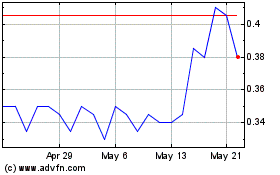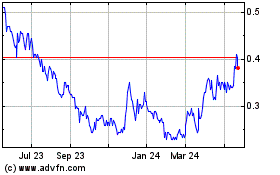Liberty Gold Corp. (TSX:LGD; OTCQX:LGDTF) (“Liberty Gold” or the
“Company”) is pleased to announce the identification of a
high-grade antimony (“Sb”) mineralizing system that outcrops along
the eastern extension of the Goldstrike Oxide Gold deposit
(“Goldstrike”), Southwest, Utah.
The Company has completed a staking program to
the east of the main Goldstrike claim block to include all areas
with potential for this mineralized system. Approximately 3.2
square kilometers of new ground has been acquired. See Figure 2
below.
The Antimony Ridge prospect is a known gold
mineralized zone that was left under-explored by Liberty Gold due
to its focus on drilling out the main oxide gold discovery area to
the west at Goldstrike. Recent recognition of antimony as a
critical mineral in the USA prompted the Company to re-assess its
historic metals databases and the significant potential of the
Antimony Ridge mineralization was identified. Additionally,
elevated antimony levels were noted in drill hole assays on the
Goldstrike Oxide deposit, up to 650 parts per million (0.065%)
Sb.
The mineralization at Antimony Ridge occurs as
exceptionally large, bladed to massive stibiconite in a jasperoid
breccia with gold. Stibiconite,
(Sb3O6[OH]), is an antimony oxide
formed from the in-situ oxidation of stibnite (Sb2S3), the primary
antimony sulfide mineral. See images in Figure 1 below:
FIGURE 1: STIBICONITE CRYSTALS
The stibiconite occurs in a large,
bedding-parallel jasperoid breccia with a sampled strike length of
450 meters (“m”). This mineral contact has been identified at
multiple locations throughout the property and current field work
has identified additional zones of antimony mineralization along
fault offsets of this contact.
Limited gold-focused surface sampling by the
Company in 2015, followed the exposed jasperoid breccia body and
identified surface antimony values up to 2.2% Sb, with gold grades
up to 0.85 grams per tonne. The apparent thickness of the
mineralized zone is up to 12 m, and it remains open along the
east-west strike and down dip to the north. The jasperoid can be
traced along this contact for more than 2 kilometres and there is
no record of any exploration drilling along the mineralized
jasperoid zone in this eastern area.
The Antimony Ridge mineralization occurs higher
in the stratigraphy than at the main gold zone, along an easily
traceable contact, which is currently being mapped & sampled
within these newly acquired lands.
Historic records indicate small-scale production
of 10 tons of antimony ore in the 1970s from the Lejaiv Unite Mine
located on Antimony Ridge. Material was mined from two small open
pits. Anecdotal evidence indicates the material mined was stibnite
ore and contained 10% Sb.
Cal Everett, CEO and Director
commented, “It is the nature of the exploration business to find
what you were not looking for in plain sight, simply due to
retention of archives that suddenly become relevant.”
FIGURE 2: GOLDSTRIKE NEW CLAIMS STAKING MAP
QUALIFIED PERSON
Peter Shabestari, P.Geo., Vice-President
Exploration, Liberty Gold, is the Company's designated Qualified
Person for this news release within the meaning of National
Instrument 43-101 Standards of Disclosure for Mineral Projects ("NI
43-101") and has reviewed and validated that the information
contained in the release is accurate.
ABOUT LIBERTY GOLD
Liberty Gold is focused on exploring for and
developing open pit oxide deposits in the Great Basin of the United
States, home to large-scale gold projects that are ideal for
open-pit mining. This region is one of the most prolific
gold-producing regions in the world and stretches across Nevada and
into Idaho and Utah. We know the Great Basin and are driven to
discover and advance big gold deposits that can be mined profitably
in open-pit scenarios.
For more information, visit libertygold.ca or contact:
Susie Bell, Manager, Investor Relations Phone:
604-632-4677 or Toll Free 1-877-632-4677 info@libertygold.ca
All statements in this press release, other than
statements of historical fact, are “forward-looking information”
with respect to Liberty Gold within the meaning of applicable
securities laws, and the potential quantity and/or grade of
minerals and Liberty Gold’s mineral resources. Forward-looking
information is often, but not always, identified by the use of
words such as “seek”, “anticipate”, “plan”, “continue”, “planned”,
“expect”, “project”, “predict”, “potential”, “targeting”,
“intends”, “believe”, “potential”, and similar expressions, or
describes a “goal”, or variation of such words and phrases or state
that certain actions, events or results “may”, “should”, “could”,
“would”, “might” or “will” be taken, occur or be achieved.
Forward-looking information is not a guarantee of future
performance and is based upon a number of estimates and assumptions
of management at the date the statements are made including, among
others, assumptions about future prices of gold and other metal
prices, currency exchange rates and interest rates, favourable
operating conditions, political stability, obtaining governmental
approvals and financing on time, obtaining renewals for existing
licenses and permits and obtaining required licenses and permits,
labour stability, stability in market conditions, the timing and
success of future plans and objectives in the areas of sustainable
development, health, safety, environment, community development;
successful resolution of disputes and anticipated costs and
expenditures and the timing of regulatory approvals. Many
assumptions are based on factors and events that are not within the
control of Liberty Gold and there is no assurance they will prove
to be correct.
Such forward-looking information, involves known
and unknown risks, which may cause the actual results to be
materially different from any future results expressed or implied
by such forward-looking information, including, risks related to
the interpretation of results and/or the reliance on technical
information provided by third parties as related to the Company’s
mineral property interests; changes in project parameters as plans
continue to be refined; current economic conditions; future prices
of commodities; possible variations in grade or recovery rates; the
costs and timing of the development of new deposits; failure of
equipment or processes to operate as anticipated; the failure of
contracted parties to perform; the timing and success of
exploration activities generally; delays in permitting; possible
claims against the Company; labour disputes and other risks of the
mining industry; delays in obtaining governmental approvals, the
completion of exploration as well as those factors discussed in the
Annual Information Form of the Company dated March 28, 2024 in the
section entitled "Risk Factors", under Liberty Gold’s SEDAR+
profile at www.sedarplus.ca.
Although Liberty Gold has attempted to identify
important factors that could cause actual actions, events or
results to differ materially from those described in
forward-looking information, there may be other factors that cause
actions, events or results not to be as anticipated, estimated or
intended. There can be no assurance that such information will
prove to be accurate as actual results and future events could
differ materially from those anticipated in such statements.
Liberty Gold disclaims any intention or obligation to update or
revise any forward-looking information, whether as a result of new
information, future events or otherwise.
Photos accompanying this announcement are available
at:
https://www.globenewswire.com/NewsRoom/AttachmentNg/9bce4277-19a7-4c9e-8bd5-a8d7999c78b7
https://www.globenewswire.com/NewsRoom/AttachmentNg/37da9f05-ac7b-4100-b486-186585f4d636
Liberty Gold (TSX:LGD)
Historical Stock Chart
From Feb 2025 to Mar 2025

Liberty Gold (TSX:LGD)
Historical Stock Chart
From Mar 2024 to Mar 2025
